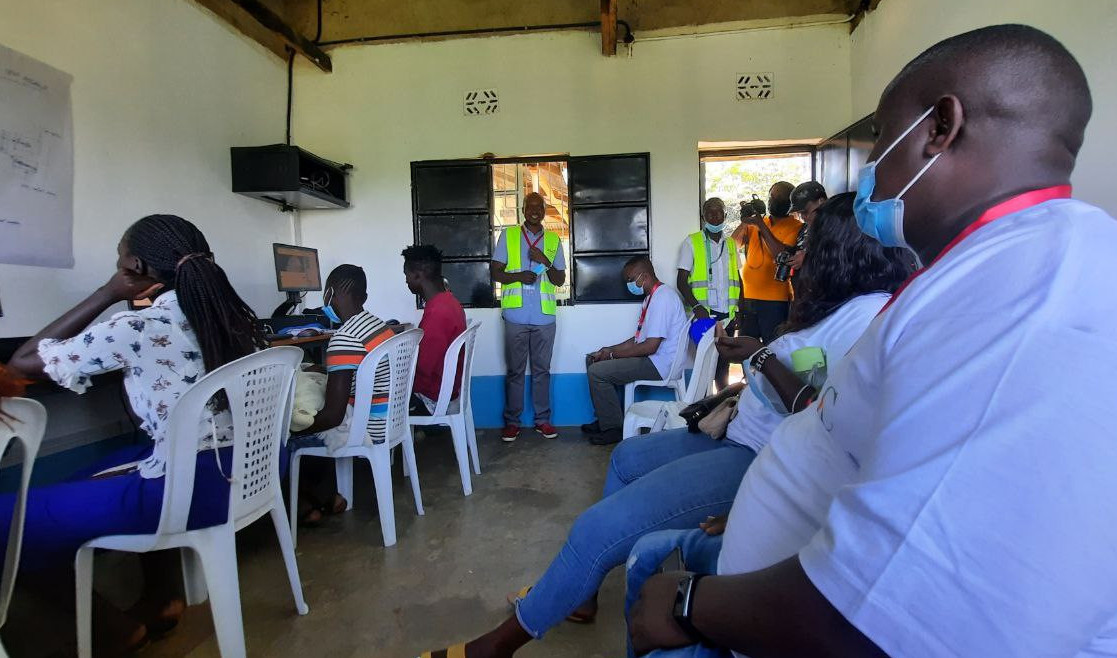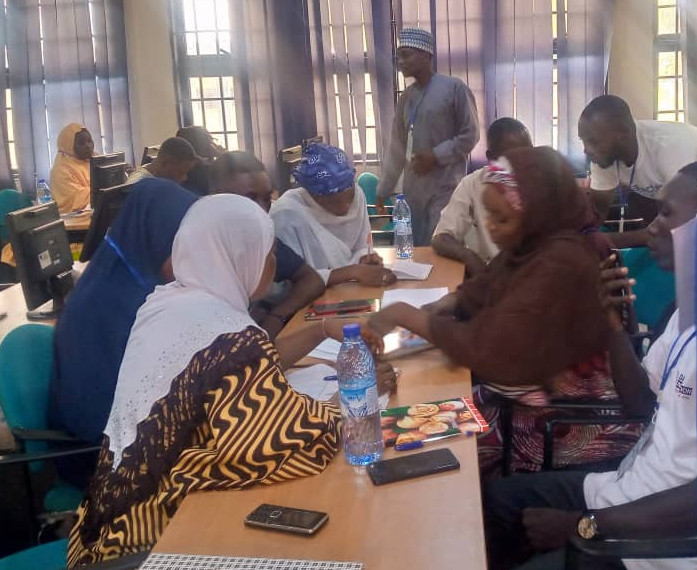
In the dynamic cyberscape of digital connectivity, community networks in Africa stand as beacons of innovation and resilience. These networks, built and managed by local communities, are pivotal in bridging the digital divide and fostering inclusive development. Recognising their critical role, the Tanda Community Network convened the Africa Community Networks Exchange on Knowledge Resources in partnership with APC and Rhizomatica through the Local Networks (LocNet) initiative. This series of four weekly webinars, from 17 January to 7 February 2024, focused on the vital aspect of capacity-building for these networks (watch the recordings below). Through these gatherings, we delve into the challenges and triumphs of these networks, exploring how they navigate complex environments to not only connect the unconnected but also support marginalised communities to harness the full potential of digital technologies.
The first webinar of this series, on 17 January, focused specifically on exploring capacity-building approaches for community networks in Africa, sharing challenges and best practices. The discussion offered an opportunity to learn from the experience of outstanding organisations such as Zenzeleni Networks in South Africa, the Centre for Information Technology and Development (CITAD) in Nigeria, and TandaNet in Kenya. The participation of these organisations in the National Schools of Community Networks* served as a shared foundation for their intervention during the gathering. However, each organisation has uniquely developed its own programme in a way that reflects specific regional contexts.
Understanding local contexts and challenges
Within the session, the first challenge that arose was how to get people to participate in creating community networks. The incredibly simple answer: build trust. Representing Zelenzeni, Nicholas Eppel and Yumna Panday showed us the relevance of being aware of the reality participants are facing. In a situation where unemployment rates soar at 34% and gender-based violence is alarmingly high, Zelenzeni's mission to bring quality, affordable connectivity and information access gains profound significance. The programme’s foundation and success lie in a deep understanding of these stark realities. The challenge to create a community of participants from varied backgrounds, ranging from novices to those with extensive technological skills, reflects an inclusive approach, vital in ensuring that the solutions devised are genuinely representative of the community’s diverse needs.
TandaNet also showed an extraordinary methodology to overcome the contextual challenges. Rooted in the principles of connectivity, co-creation and convening, its approach reflects a genuine commitment to creating a community-driven programme. This method is crucial in recognising and addressing the unique needs and aspirations of each community. TandaNet’s efforts in supporting women at the grassroots, human rights defenders, as well as engaging young creatives, underscore a nuanced understanding of diverse challenges the community faces.

An activity of the National School of Community Networks in Kenya, led by TandNet. (Photo: Courtesy of TandNet)
Similarly, CITAD’s objective of empowering communities with digital rights and freedom of expression was achieved with relevant content, after conducting needs assessments and language adaptation. CITAD bridged the gap in rural knowledge by adapting technical terms for the community. This crucial step for tailoring the training to the requirements of the community rather than imposing a one-size-fits-all solution positively went beyond routine community and network training. It created what CITAD called a learning exchange in which concepts like network or infrastructure came to life and took a hands-on approach. These nuanced understanding and different approaches to adapting to the community's context have been crucial to CITAD’s ability to create effective and impactful programmes across Africa.
CITAD's training, blending physical and online sessions, effectively balances hands-on technical learning with broader topics like advocacy and community organisation. This hybrid approach, accompanied by the mentorship phase, ensures a comprehensive skill set for participants. The inclusion of both internal and external mentors further enriches this learning ecosystem, fostering diverse perspectives and strengthening community support networks.

An activity of the National School of Community Networks in Nigeria, led by CITAD. (Photo: Courtesy of CITAD)
Innovative approaches to curriculum design
Zelenzeni's curriculum stands out for its innovative approach, particularly in how their trainers double as content creators and educators, ensuring a deep coherence and adaptability in the training material. This dynamic approach, complemented by real-time adjustments based on participants’ feedback, creates a highly responsive learning environment. Additionally, the inclusion of experienced students as peer educators not only diversifies perspectives but also reinforces the community network through a shared culture of learning and knowledge exchange. Zelenzeni’s experience demonstrates the power of horizontal learning and teaching models.
A shared characteristic from all three organisations was the formation of an advisory committee to support the development of a training programme focussed on equipping community members with technical and organisational skills for local communication and telecommunications projects. They aim to build a supportive network of community promoters, sharing knowledge and experiences to strengthen local capacities and autonomy, to create a tailored curriculum development. This committee’s role in curating the school highlights a commitment to understanding and meeting the specific needs and expertise within the organisation and its wider network.
What is valuable is to reflect on the diversity of collaborative approaches. Considering the spaces for dialogue and reflection from within is one way to strengthen the programmes, so is listening to experiences of other organisations and asking for support from experts.
Building community involvement and sustainability
This session also taught us valuable lessons about sustainability. For CITAD, sustainability was one of their biggest achievements. Through policy advocacy, it got regulators and communications authorities to conduct part of the training for the community networks. Involving decision-makers and practitioners in the community learning process can raise awareness from a bottom-up perspective.
From Zelenzeni’s experience, sustainability meant different challenges. While the programme’s emphasis on building community relationships and business acumen is a step towards sustainability, its over-reliance on grant management risks perpetuating dependence on external funding. The School in South Africa effectively translated the learned skills into tangible, self-sustaining community projects and networks. Grant management, case studies and presentations centre the programme’s success in sustainability.
Leveraging on resources, experiences and lessons learned, TandaNet’ says these are valuable elements not only for their sustainability but also to share and learn together best practices to achieve long-term impact for community networks.
Looking ahead and some open questions
The journey of Zenzeleni, TandaNet and CITAD within the National Schools of Community Networks reflects a vibrant tapestry of peer-to-peer exchanges and cross-continental learning. As these organisations move forward, they are poised to blend the rich insights from Africa, Asia, and Latin America. The impact of these community-centric, capacity-building initiatives, though gradual, is significant for the global community networks movement.
It is evident that we stand at a pivotal moment in Africa's digital journey. The path to a connected continent is not just paved with cables and codes but also with the aspirations and tenacity of its people. The stories of community networks are more than technical case studies; they are narratives of empowerment, resilience and hope.
Yet, as we look ahead, several questions remain. How can we further dismantle the regulatory barriers that stifle the growth of community networks? What innovative financial models can we develop to ensure the sustainability of these grassroots initiatives? And importantly, how can we amplify the voices of these communities to ensure they are heard in the halls of policymaking? The journey ahead is complex, but the unwavering spirit of collaboration and innovation showcased in this session gives us reason to be optimistic. As we continue to weave our digital fabric, let’s carry forward the dialogue sparked in this session. The story of Africa’s digital transformation is still being written, so do join the upcoming events from this region to ask the tough questions, seek innovative solutions, and, most importantly, listen to the voices of the communities at the heart of this digital revolution.
* The National Schools of Community Networks project is a collaborative effort aimed at fostering digital inclusion and meaningful connectivity in five global South countries: South Africa, Kenya, Nigeria, Indonesia and Brazil. Initiated by APC and Rhizomatica under the LocNet initiative, and funded by the UK Government’s Digital Access Programme, this project involves local organisations, including Zenzeleni, TandaNet, CITAD, Common Room, and PSA, each representing a country. These schools adopt a participatory approach to training and mentorship focusing on various aspects of community networks such as services, sustainability, policy, and communication. They engage local communities in both face-to-face and online activities, aimed at strengthening or expanding community networks in their respective regions.
Featured image: Participants of South Africa's first Community Networking School in a hands-on activity during the training programme. Photo: Daniela Bellow